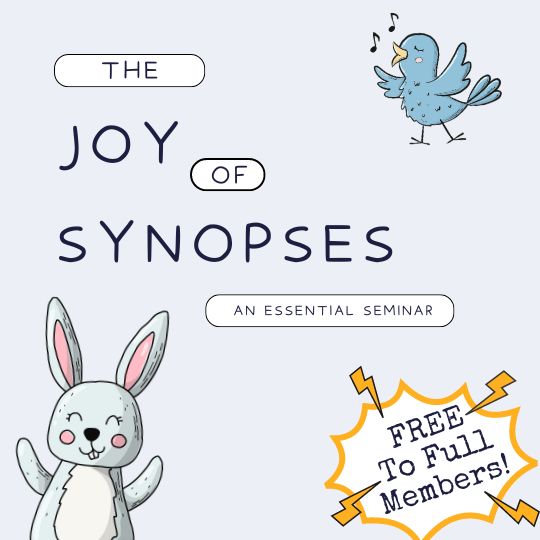Here’s the thing.
There’s been a lot of chat about feedback recently, and I’ve come to realise that what I hear in my head just might not be the same thing as everyone else hears.
So, I wanted to chat about it with you.
Because when I’m offered feedback, I hear two things: -
‘Your work is worth spending my time and attention on,’ and, ‘I think you are under-using your talent and I’m absolutely certain you can do better.’
Basically, I hear someone complimenting me.
And the stronger the feedback is, the more of a compliment it seems (you think I’m sooo much more talented than this work currently shows, and you’re sure I can do way, way, WAY better).
Obviously, I didn’t hear this the first time I got it.
No, the first time someone said my precious, blood-sweat-and-tears baby was anything less than prefect my soul took a minor (but temporary) crushing.
But this was when I was 53 and had finally made it to university.
I learned very quickly that critiquing was how it was done. I simply had to get used to it.
So, I took lots of big-girl pills, drank copious amounts of coffee, learnt how to really get the most out of a 2-4-1 cocktail happy hour, and went back to the drawing board. Over and over again.
Gradually, I started to unravel what they were saying to me in the feedback sessions (cos I know it was in Klingon at the start), and my work slowly became significantly less crap.
Then I started to notice something fairly important – feedback varied depending on who it was being given to.
Not from the teachers – it was their job to give us all the help they could shove on us.
But as a group, giving our fellow students critiques, I noticed a tendency to give less and less feedback to people who showed no desire to follow it or learn from it.
The group started to lose its willingness to invest in people who showed they didn’t want to know.
That’s when I realised this: someone putting effort into helping me improve my work is a massive compliment!
It means they think I’ll listen. It means they think I’ll progress.
It means they see what I’m doing as being worth their investment, both in time and attention.
Why would I not want that?
And then I saw another thing happening in our group.
Those students who were receptive to feedback found their work improving way beyond their own expectations.
We would often say to each other, ‘I didn’t know I could do that,’ with a mixture of pride, and awe, and frank astonishment.
After each critiquing session there’d be a period of assimilating the information (ok, first there’d be the moaning and the agonising self-doubt over the 2-4-1 cocktails, but then there’d be the assimilation). And I’d watch everyone’s work take extraordinary leaps forward. Even my own.
That’s when I understood the second thing: when others push me, it’s because they believe I have what it takes to do more. Compliment.
They see a seed of potential that I don’t even know is there yet. They see how much further I can go, and what’s more, they want me to get there. Double compliment.
And the harder they push me – the stronger the feedback – the higher they see me being able to go. Oh, hell yeah, baby.
So, yes, I love feedback. I love giving it and I love receiving it.
I am delighted when someone wants to invest in me. And I am honoured when someone allows me to invest in them.
At 53, I may have been a bit long in the tooth to have started this writing journey, but the more I’ve opened myself to critique in these last 10 years, the quicker I’ve progressed.
So, bring it on, all you lovely Litopians. You’ve helped me so much already, but I’ve still got a lot of catching up to do.
Much gratitude and big hugs all round. x
There’s been a lot of chat about feedback recently, and I’ve come to realise that what I hear in my head just might not be the same thing as everyone else hears.
So, I wanted to chat about it with you.
Because when I’m offered feedback, I hear two things: -
‘Your work is worth spending my time and attention on,’ and, ‘I think you are under-using your talent and I’m absolutely certain you can do better.’
Basically, I hear someone complimenting me.
And the stronger the feedback is, the more of a compliment it seems (you think I’m sooo much more talented than this work currently shows, and you’re sure I can do way, way, WAY better).
Obviously, I didn’t hear this the first time I got it.
No, the first time someone said my precious, blood-sweat-and-tears baby was anything less than prefect my soul took a minor (but temporary) crushing.
But this was when I was 53 and had finally made it to university.
I learned very quickly that critiquing was how it was done. I simply had to get used to it.
So, I took lots of big-girl pills, drank copious amounts of coffee, learnt how to really get the most out of a 2-4-1 cocktail happy hour, and went back to the drawing board. Over and over again.
Gradually, I started to unravel what they were saying to me in the feedback sessions (cos I know it was in Klingon at the start), and my work slowly became significantly less crap.
Then I started to notice something fairly important – feedback varied depending on who it was being given to.
Not from the teachers – it was their job to give us all the help they could shove on us.
But as a group, giving our fellow students critiques, I noticed a tendency to give less and less feedback to people who showed no desire to follow it or learn from it.
The group started to lose its willingness to invest in people who showed they didn’t want to know.
That’s when I realised this: someone putting effort into helping me improve my work is a massive compliment!
It means they think I’ll listen. It means they think I’ll progress.
It means they see what I’m doing as being worth their investment, both in time and attention.
Why would I not want that?
And then I saw another thing happening in our group.
Those students who were receptive to feedback found their work improving way beyond their own expectations.
We would often say to each other, ‘I didn’t know I could do that,’ with a mixture of pride, and awe, and frank astonishment.
After each critiquing session there’d be a period of assimilating the information (ok, first there’d be the moaning and the agonising self-doubt over the 2-4-1 cocktails, but then there’d be the assimilation). And I’d watch everyone’s work take extraordinary leaps forward. Even my own.
That’s when I understood the second thing: when others push me, it’s because they believe I have what it takes to do more. Compliment.
They see a seed of potential that I don’t even know is there yet. They see how much further I can go, and what’s more, they want me to get there. Double compliment.
And the harder they push me – the stronger the feedback – the higher they see me being able to go. Oh, hell yeah, baby.
So, yes, I love feedback. I love giving it and I love receiving it.
I am delighted when someone wants to invest in me. And I am honoured when someone allows me to invest in them.
At 53, I may have been a bit long in the tooth to have started this writing journey, but the more I’ve opened myself to critique in these last 10 years, the quicker I’ve progressed.
So, bring it on, all you lovely Litopians. You’ve helped me so much already, but I’ve still got a lot of catching up to do.
Much gratitude and big hugs all round. x




